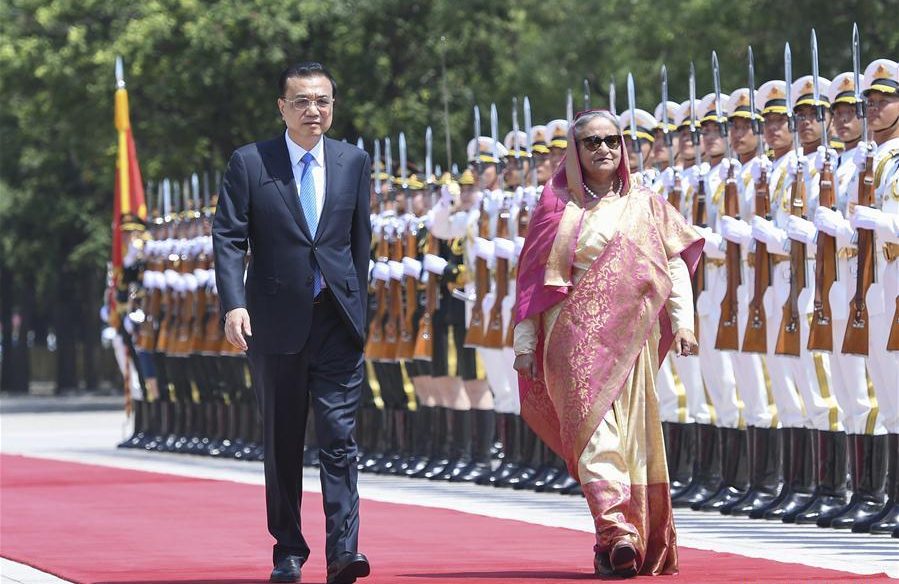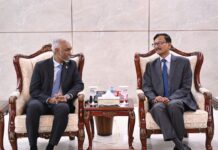BEIJING: China and Bangladesh on Thursday agreed to advance their cooperation under the multi-billion dollar Belt and Road Initiative (BRI) as Prime Minister Sheikh Hasina held wide-ranging talks with her Chinese counterpart Li Keqiang to further consolidate the bilateral ties and signed several agreements.
On her first visit to China after her re-election, Hasina, who was accorded a red carpet welcome, held talks with Chinese Premier Li during which a consensus was reached to step-up cooperation under the BRI, official Chinese media reported.
After the talks, Li and Hasina witnessed the signing of bilateral cooperation agreements in different sectors ranging from aid for the Rohingyas, economic and technical cooperation, investment, power, culture, tourism and water conservancy.
China agreed to provide 2,500 tonnes of rice to the forcibly displaced Rohingyas from Myanmar, Foreign Secretary Md Shahidul Haque told Bangladesh’s state-run BSS news agency.
In his talks with Hasina, Li stressed that China stood ready to better synergize the BRI with Bangladesh’s development strategy and speed up mutually beneficial cooperation in various fields.
He called on the two sides to work together to build the Bangladesh-China-India-Myanmar (BCIM) economic corridor in a bid to connect the market covering nearly three billion people.
The reference to the BRI and the BCIM by Li is regarded as significant from India’s point of view.
Under the BRI, China has been routing most of its investments through its multi-billion-dollar global project aimed at financing and building infrastructure projects, especially in developing countries to enhance its influence across the world.
The BRI investments were criticised by the US as debt trap especially after Sri Lanka handed over its Hambantota port as debt swap to China in 2017.
The controversial USD 60 billion China-Pakistan Economic Corridor (CPEC) and BCIM are the components of the BRI, which was mooted by Chinese President Xi Jinping in 2013. While the CPEC regarded as the flagship project of the BRI took off, the BCIM failed to make headway.
India has protested to China over the CPEC as it is being laid through Pakistan-occupied Kashmir.
China lately is making efforts to revive the BCIM.
After a long gap, Xi raised the BCIM project during his meeting with Prime Minister Narendra Modi at Bishkek on the sidelines of the Shanghai Cooperation Organisation summit early this month.
The 2800-km BCIM corridor proposes to link Kunming in China’s Yunnan province with Kolkata, passing through nodes such as Mandalay in Myanmar and Dhaka in Bangladesh before heading to Kolkata.
With an estimated USD 31 billion investments, China has emerged as a major investor in Bangladesh – mainly in the infrastructure and energy sectors – raising concerns in India over growing Chinese influence in the region.
The rapid expansion of Chinese investments in Bangladesh was regarded as the second highest by Beijing after the USD 60 billion CPEC.
During his talks with Hasina, Li also expressed expectation to discuss the feasibility of a joint study on the free trade agreement, increase import of Bangladeshi high-quality products meeting the needs of the Chinese market, promote balanced development of trade, and facilitate bilateral investment and personnel exchanges.
China will continue to provide assistance within its capacity for Bangladesh’s development, Li added.
Hasina said both sides are committed to peace, stability, mutual benefits, and settlement of disputes by peaceful means.
She said Bangladesh was advancing the goal of “Sonar Bangla” at present, reiterating that her country was willing to actively participate in the joint construction of BRI, accelerate the building of the BCIM, press ahead regional connectivity, beef up cooperation on trade, investment, service and infrastructure, so as to jointly embrace an even better future, Xinhua news agency reported.
Hasina began her visit on July 3 by taking part in the Summer Davos meeting held at the Chinese city of Dalian.
She is also scheduled to meet Xi before winding up her visit on Friday.
China in recent years has ramped up its investments in Bangladesh especially after the visit of Xi in 2016.
China’s investments in Bangladesh included the construction of a 6-km long bridge across the Padma river, as the Ganga is known in the country, costing about USD 3.7 billion and the USD 2.5 billion power plant at Payra near Dhaka. PTI







